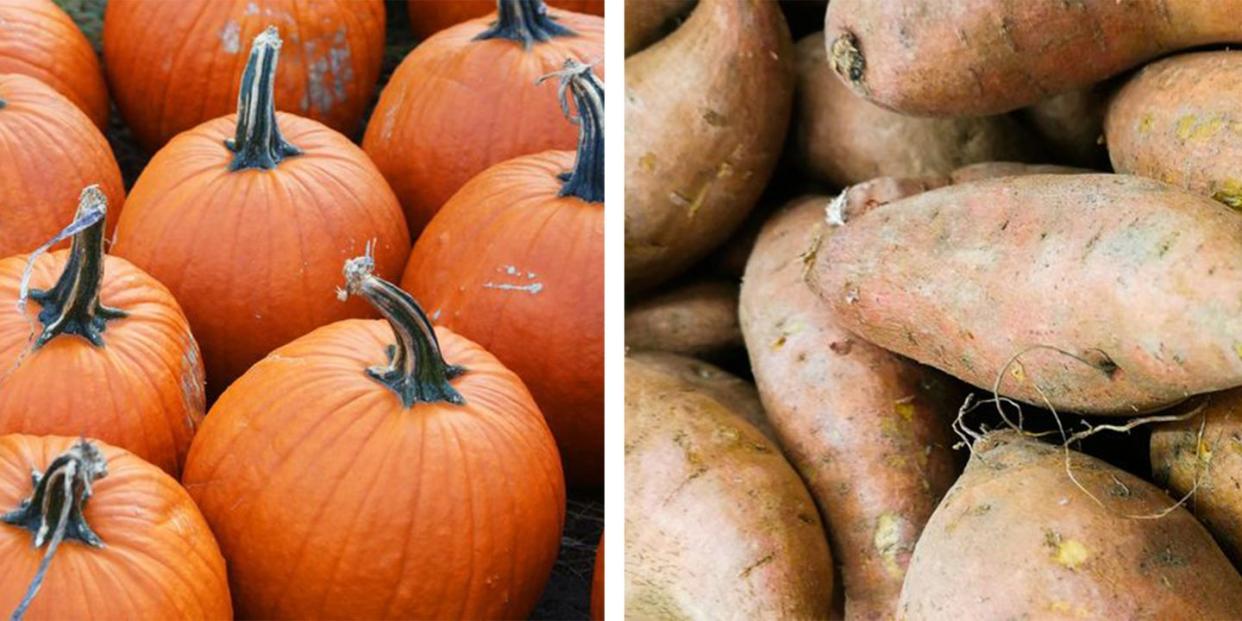Fall Nutrition Faceoff: Pumpkin vs. Sweet Potato

It’s the age-old fall dinner party debate–who’s bringing the pie this year? Some families stand by pumpkin, and others prefer the naturally sugary sweet potato. Whichever you end up eating, they’re both orange, sweet, and delicious. So, what’s the big deal?
Well, if you’re a health junkie or simply want some science to back you up in the kitchen, there is a nutritional winner between these two hardy fall favorites. While neither pumpkins nor sweet potatoes make the “superfood” cut, research shows that their nutritional makeup provides certain exceptional health benefits. Find out what they’ll do for you and which one is the ultimate nutrition champ.
First, what kind of food are sweet potatoes and pumpkins, anyway?
Strolling through a farmers’ market, you may notice a bit of dirt caked onto the piles of sweet potatoes. It’s no mystery that these dark-orange tubes are root vegetables. But strangely, pumpkins are a bit more ambiguous in terms of where they fall for classification. “A pumpkin is technically a fruit because it’s a product of the seed-bearing structure of flowering plants,” says Jerlyn Jones, an R.D.N in Atlanta. As with squash, tomatoes, and other fruits we typically cook, pumpkins are more savory than sweet and are often placed in the vegetable category. From the culinary perspective, a pumpkin is much closer to a sweet potato than it is to an apple or pear.
How the pumpkin vs. sweet potato health benefits shake out
When you look closely at both foods, you’ll find that while you can’t go wrong, one has a bit of an edge.
Reducing the risk of chronic disease
High amounts of beta-carotene—the yellow-orange pigment that gives fruits and vegetables their vibrant color—are found in both pumpkins and sweet potatoes. Beyond its pretty color, this carotenoid is a rich antioxidant that has a host of benefits. “A diet rich in foods containing beta-carotene may reduce the risk of developing certain types of cancer and offers protection against heart disease,” explains Jones. “Beta-carotene offers protection against other diseases as well as some degenerative aspects of aging.”
Research from the Agricultural Research Service (ARS) has shown that pumpkins have more beta-carotene than many other foods in the average pantry, with one cooked cup (245 g) containing 5,140 micrograms. The bright orange sweet potato is also incredibly high in beta-carotene. One cup of cooked sweet potato (328 g) has 31,000 micrograms—that’s 25,860 more than its counterpart!
Winner: Sweet potato
Immunity-boosting vitamins
Speaking of vitamin A, both sweet potato and pumpkin are rich in vitamins that help boost your immunity. “One cup of cooked pumpkin contains 245% RDI (recommended daily intake) of vitamin A and 19% RDI of vitamin C,” says Jones. Yet sweet potato knocks pumpkin out of the park with one cup providing 774% of vitamin A and 53% of vitamin C.
Winner: Sweet potato (again!)
Gut health
“Good sources of fiber encourage a healthy gut microbiota and promote bowel health,” Jones explains. When only 5% of Americans meet the recommended fiber intake, going for sweet potatoes can help nudge you in the right direction.
With 8.2 grams of fiber in one cup of sweet potato, this veggie does a bit more heavy lifting than one cup of pumpkin, which only contains 3 grams of fiber. Beyond your gut, high fiber diets are also associated with a reduced risk for heart disease, stroke, hypertension, obesity, type 2 diabetes, and certain cancers. That should be enough to encourage you to load up your plate at Thanksgiving!
Winner: Sweet potato (seeing a theme?)
How do the rest of their nutrients stand up?
These classic pie fillings may look similar but diverge nutritionally in most respects. They’re equal in potassium, an essential mineral that helps muscles contract and supports normal blood pressure. However, when pumpkin is out of its natural pie habitat, it’s definitely lower in sugar than sweet potatoes (a win for pumpkin!). But while sweet potatoes have more calories, that’s because they are packed with greater amounts of carbohydrates, protein, and fats (all necessary parts of your diet).

The final result: Sweet potato wins!
Here’s the thing, though: Both of these creamy fall favorites are great choices. When choosing between two vegetables, it’s basically impossible to make a wrong decision. Each veggie has a unique nutritional profile, but at the end of the day, your body will always be happy if you feed it something that grew in the ground.
However, if you place the two in a side-by-side comparison, sweet potato generally outpaces pumpkin in its nutritional makeup from vitamin A to fiber to protein. While pumpkin is a light, low sugar option, sweet potatoes do more heavy lifting and will ultimately feed your body more essential nutrients.
You Might Also Like

